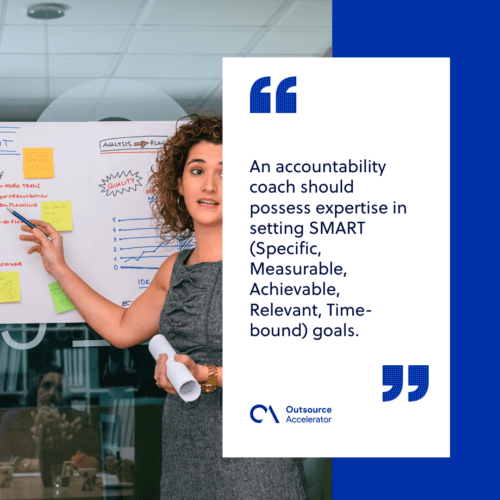Why you must hire an accountability coach

Juggling personal and professional goals can feel overwhelming. Meeting targets, chasing dreams, or maintaining a work-life balance leads to challenges.
This is where an accountability coach steps in.
This article will discover the compelling reasons for how accountability coaches can significantly benefit workers and employers.
What is an accountability coach?
Hiring an accountability coach means having a dedicated partner in your corner, specifically focused on helping you and your team achieve your goals.
An accountability mentor guides organizations in setting targets, staying on track, and reaching milestones.
For employers, an accountability coach becomes an invaluable asset. The coach helps boost productivity by fostering growth and ensuring everyone stays accountable for their responsibilities and objectives.

Importance of an accountability coach
Accountability coaches are essential because they play multiple roles within a team’s dynamics, including:
Keeps team on track
Mentors ensure that team members remain aligned with their objectives. They provide a structured framework that keeps everyone focused on individual and collective goals.
This translates into a more efficient and goal-oriented workforce, ultimately contributing to the company’s success.
Motivation booster
Employers understand the importance of a motivated team. An accountability coach is a motivator, inspiring and giving employees a clear direction.
Accountability coaches encourage and boost team spirit, which leads to better work and commitment.
Provides feedback and guidance
Feedback is integral to growth. An accountability coach offers constructive criticism and guidance to team members.
This facilitates continuous improvement, refining skill sets, and enhancing performance levels across the board.
Increases responsibility
In a workplace setting, accountability is vital. Coaches encourage a culture of responsibility among employees.
They ensure that individuals are responsible for their actions and commitments.
Customized support
Every team member possesses unique strengths and challenges. An accountability coach recognizes this diversity and tailors the given support to address individual needs.
This personalized approach empowers employees.
A coach ensures employees receive specific guidance for professional development and company success.
Roles and responsibilities of an accountability coach
When considering the roles and responsibilities of an accountability coach, several vital aspects come to the forefront, including:
Role modeling and inspiration
An accountability coach is a role model that sets an example for employees. This professional’s dedication, work ethic, and commitment inspire the team to strive for excellence.
Embodying the desired qualities motivates others to perform at their best.
Maintaining confidentiality and trust
Employers highly value trust within their teams. An accountability coach operates within a confidentiality framework, creating a safe space for open communication.
The coach guarantees that sensitive information shared during coaching sessions remains confidential.

Using resource and network utilization
An accountability coach taps into a vast network of resources and connections beneficial to the team.
Using these resources effectively offers essential knowledge, tools, and connections that help employees reach their goals efficiently.
Goal setting
Setting achievable and meaningful goals is crucial for organizational success.
Accountability coaches collaborate with employees to establish clear, realistic goals aligned with the company’s objectives. They break down larger goals into manageable steps, ensuring each contributes to the overall success.
Action planning
Developing a roadmap to success involves detailed action planning. A coach assists employees in crafting actionable plans.
These plans outline the specific steps needed to reach goals, maintaining a structured approach toward achieving desired outcomes.
Skills to look for in an accountability coach
The following are the skills to look for in an accountability coach:
Possess excellent communication skills
An accountability coach must excel in communication. A premier mentor should listen actively, articulate thoughts clearly, and convey information effectively.
The ability to understand and be understood lays the foundation for a successful coaching partnership.
Has empathy and understanding
Empathy is a vital trait in an accountability coach. Understanding team members’ challenges, motivations, and emotions fosters a supportive environment.
An empathetic coach builds rapport and establishes trust, creating a conducive space for growth.
Goal-setting and planning expertise
An accountability coach should possess expertise in setting SMART (Specific, Measurable, Achievable, Relevant, Time-bound) goals.
A coach’s skill in planning guarantees that objectives are well-defined, realistic, and strategically aligned with individual and organizational aims.

Flexibility and adaptability
In a dynamic work environment, adaptability is critical. A coach who can pivot strategies and adapt to changing circumstances proves invaluable.
Professionalism and trustworthiness
Professional conduct and trustworthiness are non-negotiable.
Employers look for coaches who keep information private, follow ethical guidelines, and show honesty and integrity in their coaching sessions.
A reliable coach helps employees and employers feel confident, strengthening the coaching relationship.
When to hire an accountability coach
Employers should consider hiring an accountability coach when observing sure signs within their team dynamic, such as:
Difficulty in goal achievement
It might be a good idea to get help from an accountability coach if employees consistently struggle to meet set goals despite the efforts and resources allocated.
Their knowledge and skills can pinpoint challenges and create plans to overcome them.
Feeling stuck or overwhelmed
Employees who are feeling stuck or overwhelmed by tasks could find guidance from an accountability coach.
Coaches offer support. They help individuals navigate challenges and regain momentum toward achieving their objectives.
Time management issues
Employees may frequently encounter challenges in managing their time effectively, resulting in missed deadlines or uncompleted tasks.
Hiring a coach can help prioritize tasks, improve productivity, and optimize time management skills.
Lack of clarity or direction
It can slow down their progress if employees need clarification on their direction. An accountability coach can assist by:
- Aligning their focus
- Clarifying goals
- Creating a clear path to success
Further, coaches work towards defining clear goals and strategies, guiding employees towards a more focused and purposeful approach.
Employers seeking enhanced productivity and growth within their teams can leverage the services of accountability coaches.
These professionals play a pivotal role in individual success and in fostering a culture of responsibility and achievement within organizations.







 Independent
Independent




